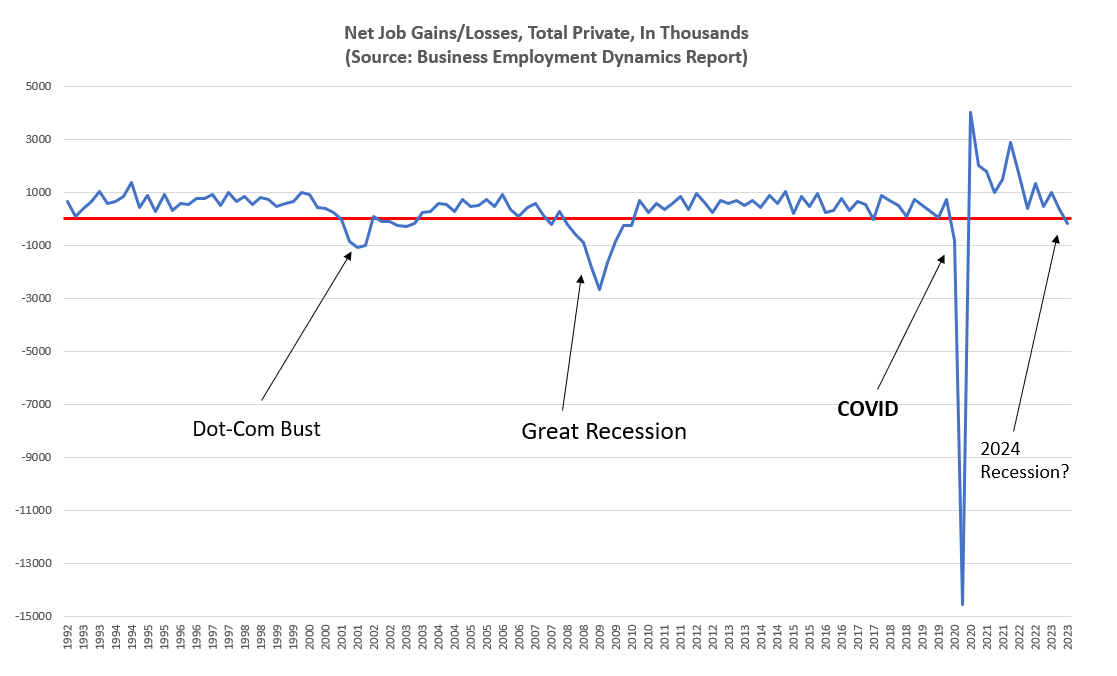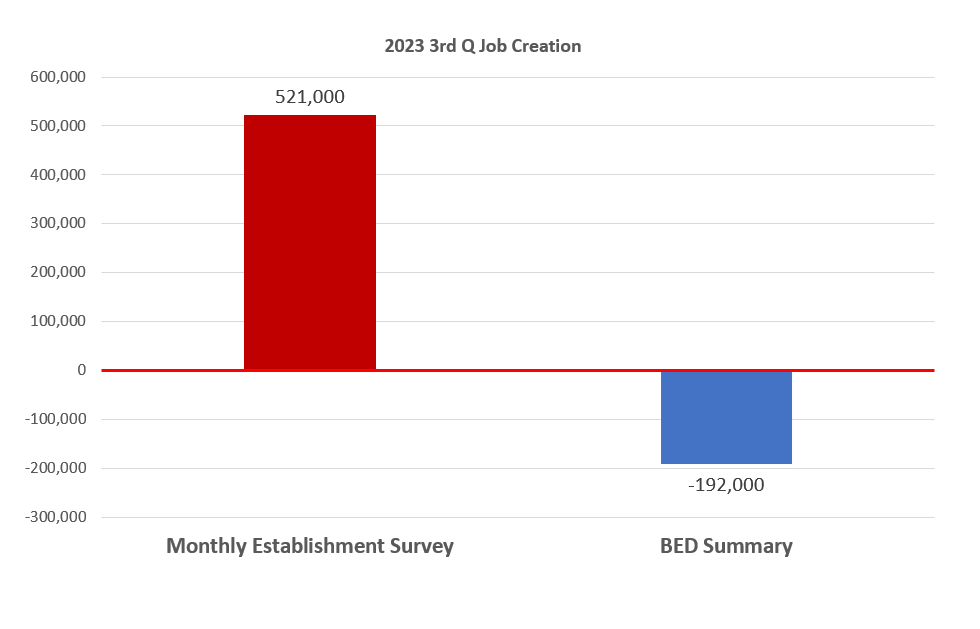The most recent Business Employment Dynamics (BED) summary from the Bureau of Labor Statistics shows that the US economy lost 192,000 private-sector jobs during the third quarter of 2023. According to the BLS: From June 2023 to September 2023, gross job losses from closing and contracting private-sector establishments were 7.8 million, a decrease of 37,000 jobs from the previous quarter, the U.S. Bureau of Labor Statistics reported today. Over this period, gross job gains from opening and expanding private-sector establishments were 7.6 million, a decrease of 561,000 jobs from the previous quarter. The difference between the number of gross job gains and the number of gross job losses yielded a net employment decline of 192,000 jobs in the private sector during
Topics:
Ryan McMaken considers the following as important: 6b) Mises.org, Featured, newsletter
This could be interesting, too:
Martin Hartmann writes «Das wichtigste Menschenrecht ist es, in Ruhe gelassen zu werden.»
Marc Chandler writes Week Ahead: Can the US CPI Do What Payrolls Didn’t and Persuade the Market that the Fed Will Deliver a 50 bp Cut ?
Ryan McMaken writes America Now Has Fewer Employed Workers than It Did a Year Ago
Wanjiru Njoya writes Conceptual Clarity in Dismantling Economic Jargon
The most recent Business Employment Dynamics (BED) summary from the Bureau of Labor Statistics shows that the US economy lost 192,000 private-sector jobs during the third quarter of 2023. According to the BLS:
From June 2023 to September 2023, gross job losses from closing and contracting private-sector establishments were 7.8 million, a decrease of 37,000 jobs from the previous quarter, the U.S. Bureau of Labor Statistics reported today. Over this period, gross job gains from opening and expanding private-sector establishments were 7.6 million, a decrease of 561,000 jobs from the previous quarter. The difference between the number of gross job gains and the number of gross job losses yielded a net employment decline of 192,000 jobs in the private sector during the third quarter of 2023.
That may seem odd to many readers who have become accustomed to the non-stop drumbeat of monthly federal employment reports showing “blowout” job gains and “hot” labor markets.
The discrepancy between the BED’s dour numbers and the usual monthly upbeat report comes from the fact that the monthly reports come from a much smaller—and more hastily produced—employment survey that relies heavily on a more “flexible” use of estimates and revisions.
The BED, report, which is quarterly, and released months after the time period in question, incorporates more extensive data into the final estimates. Thus, we end up with a situation in which the monthly Establishment survey—which receives nearly all the media attention on jobs numbers—shows a very different picture from the BED survey.
Looking specifically at the most recent report, we find a quarter-to-quarter drop of 192,000 jobs. That’s the worst job-growth total in 14 quarters, and the worst since the Covid Panic was in full swing during the second quarter of 2020.
Moreover, negative growth in a the BED is a fairly solid indicator of an approaching recession. The only quarter in which a negative print did not point to recession, over the past 35 years, was during the third quarter of 2017. We can see in the graph, however, that a negative turn in the net job gains usually points to recession:

To this day, however, the usual, monthly Establishment report still points to significant job gains in the third quarter—even after revisions. If we take the third-quarter average for the Establishment survey’s estimate of private-sector jobs, we find a gain of 521,000 jobs. That’s a wee bit off from the BED survey’s result of negative 192,000.

Which survey is more plausible? Well, as we’ve noted here at mises.org before, the monthly Establishment survey continues to show far more job growth that other surveys, whether we’re talking about the monthly Household survey, the Quarterly Census of Employment and Wages, and the BED survey. It’s enough to make one think that the monthly Establishment report is the outlier. It’s interesting, however, that the media chooses to focus its attention on the report that repeatedly brings the most good news for the White House.
Tags: Featured,newsletter
